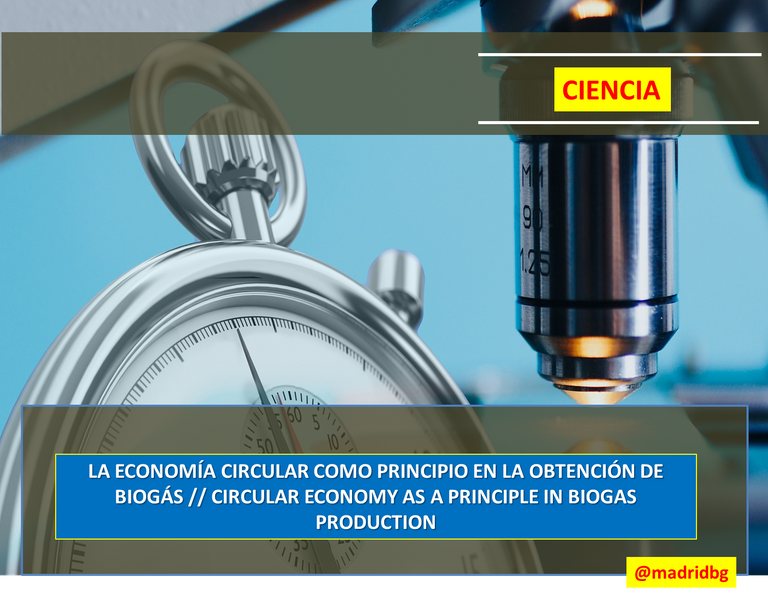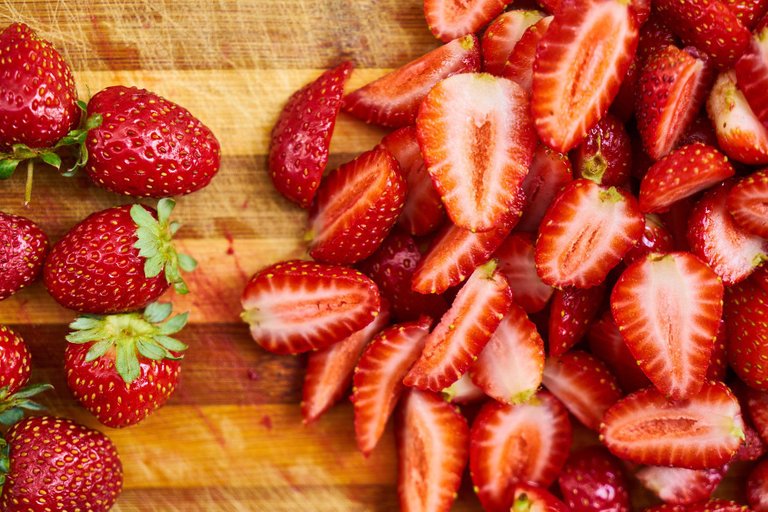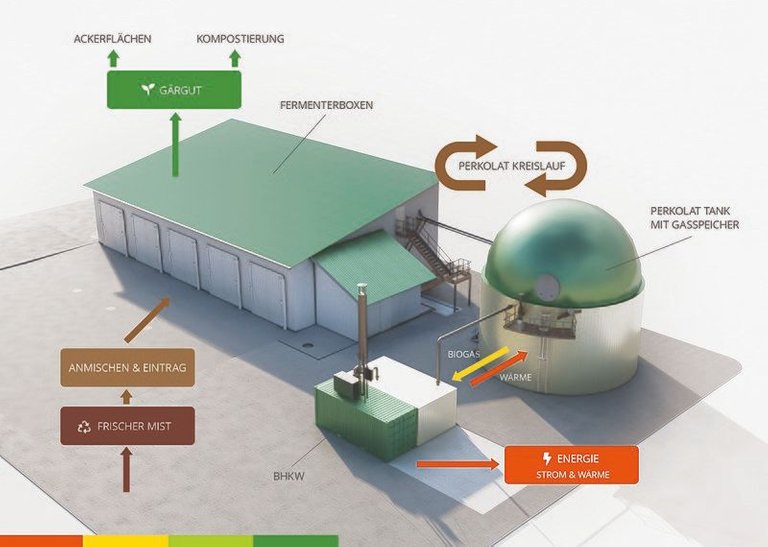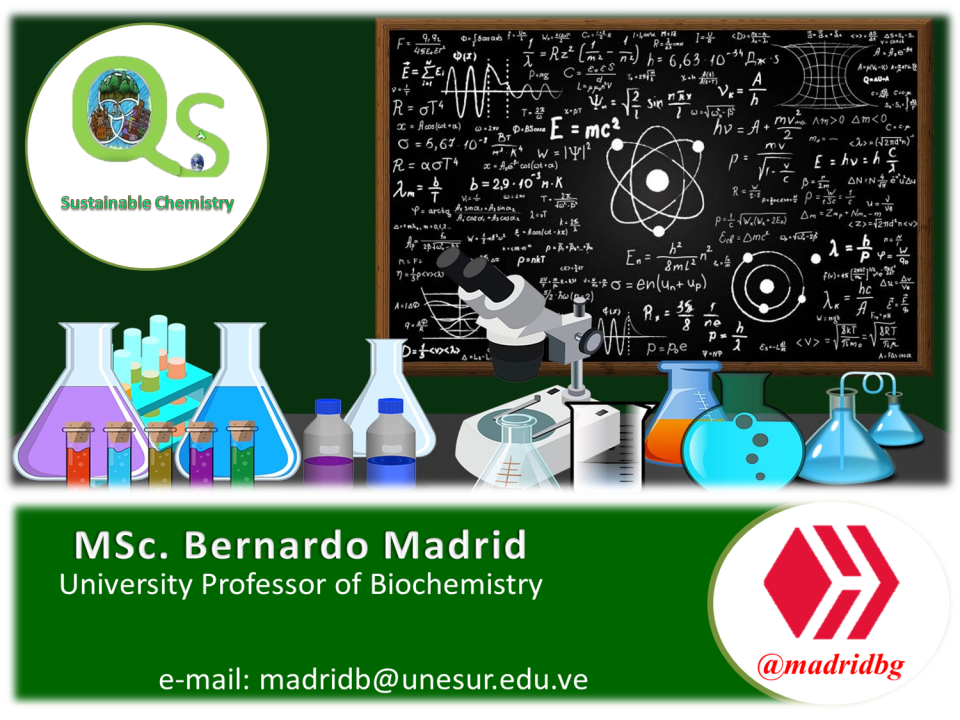LA ECONOMÍA CIRCULAR COMO PRINCIPIO EN LA OBTENCIÓN DE BIOGÁS // CIRCULAR ECONOMY AS A PRINCIPLE IN BIOGAS PRODUCTION

Autor: @madridbg, vía Power Point 2010, utilizando imágenes de dominio público. Gerd Altmann
Saludos y bienvenidos estimados lectores de esta prestigiosa plataforma, en especial a todos aquellos usuarios que se hacen vida a diario en la comunidad de @Cervantes, a través de las siguientes líneas de escritura, estaremos abordando una temática de índole científica con aportaciones prácticas y ambientales que permita comprender la importancia de la economía circular en el bienestar y cuidado de nuestro entorno.
En este sentido, la economía circular funge como aquellos principios que permite ejecutar un nuevo sistema de engranaje para los residuos o desechos producidos, en función de alcanzar una utilidad técnica para que estos puedan ser utilizados en una nueva línea de producción.
Por consiguiente, si partimos de esta definición, estaremos en presencia de brindarle una utilidad a los productos orgánicos, específicamente los concebidos como desechos, en consecuencia y a modo de ejemplificar el abordaje anterior, buscaremos explicar los mecanismos conceptuales y metodológicos que nos permita comprender la utilidad de la economía circular en función de la producción de biogás, a partir de residuos de fresas, de manera que en primera instancia, estaremos bio-transformando los desechos obtenidos y generado en estos una utilidad válida para nuestra sociedad, al mismo tiempo estaremos aportando en el bienestar y cuidado de nuestro entorno, reduciendo la contaminación y acumulación de los mismos.

Autor: Engin Akyurt
Por consiguiente, nos apoyaremos en una serie de investigaciones que se vienen desarrollando desde el Centro de Investigación del Instituto de la Grasa en Sevilla, los cuales han logrado implementar técnicas biológicas de cara a la bio-transformación de la materia orgánica y para ello han utilizado microorganismos, específicamente bacteria que son capaces de obtener un consumo sostenido de los residuos obtenidos a partir de la manufactura de la fresa y en consecuencia producir biogás como alternativa energética de cara a las exigencia que demanda la sociedad y nuestro planeta.
En consecuencia, para nadie resulta un secreto que las industrias encargadas de la transformación y producción de alimentos en base a fresas, han centrado su atención solo en la producción de mermeladas, yogures y saborizantes de los cuales solo se aprovecha el zumo de los frutos y lo restante es considerado como desecho y terminan acumulándose en los vertederos.
De allí deriva la importancia del estudio, el cual puede replicarse en otros países ya que permite la transformación de residuos y la obtención de nuevos materiales o productos como el ácido acético tan utilizando en la elaboración de plásticos, así como en la fabricación de fertilizantes químicos.
Por consiguiente, la metodología aplicada no es diferente a los proceso ya conocido, para ello, los investigadores recolectan la biomasa y la colocan en reactores sobrecargado con la presencia de material bacteriano anaeróbico, entiéndase estos, como aquellos organismos que tienen la capacidad de degradar la materia orgánica en ausencia de oxígeno, de manera que en este punto el control de temperatura (35° C) es uno de los puntos clave dentro del mecanismo de funcionamiento de la investigación.

Autor: Thzorro77
Otros de los aspectos determinantes y que afecta gradualmente la eficacia de las bastarías es el control de pH dentro de los reactores, por lo cual los investigadores de vieron en la necesidad de evaluar el comportamiento de las especie bacteriana en función a los cambio de pH.
En este sentido, los investigadores pudieron establecer que las bacterias generan un 42% de ácido propiónico a partir de los residuos de fresas y esta sustancia química sin duda es útil en la elaboración de herbicidas y aromas para mejorar las características de productos químicos.
Por su parte, cuando los niveles de pH fueron controlados a un rango de 7 es decir neutro, las bacteria se hicieron más eficaces y solo bastó en promedio 2 días para trasformar el 70% de los residuos de fresa en metano, lo que equivales a la obtención de 340 ml de metano / gramo de materia orgánica, lo cual es un indicio de la eficacia del proceso en cuanto a la obtención de energía se refiere.
Por último, cuando el pH es controlado alrededor de 9, lo microorganismo son capaces de degradar los desechos, sin embargo, el material obtenido es ácido acético en una relación superior al 50%, material que puede ser implementado en la síntesis de bio-plásticos.
Por consiguiente y a mi modo de ver las cosas, estamos en presencia de una metodología científica con resultados alentadores que nos permite brindar un utilidad válida para los residuos de fresas u otro material de desechos de índole orgánico y lo mejor de todo es que el material restante puede ser utilizado en forma de fertilizante para la misma industria agroalimentaria.
CONSIDERACIONES FINALES

Para nadie es un secreto que nuestra sociedad cada día es más exigente en cuando a energía se refiere, de manera que a nivel científico se vienen buscando alternativas que permitan seguir cumpliendo con las exigencia, pero que al mismo tiempo no afecte a nuestro entorno, por lo cual este tipo de investigaciones nos permiten avanzar en función de presentar nuevas alternativas que nos hagan más eficaces en el tratamiento de los desechos o contaminantes que como sociedad producimos y que estos sirvan para mejorar y aportar beneficios a nivel industrial.
BIBLIOGRAFÍA CONSULTADA

[1] Cardoso and collaborators. Enhancing the recovery of volatile fatty acids from strawberry extrudate through anaerobic fermentation at different pH valuesArtículo: Acceso Online
ENGLISH VERSION

Greetings and welcome dear readers of this prestigious platform, especially to all those users who live daily in the community of @Cervantes, through the following lines of writing, we will be addressing a scientific topic with practical and environmental contributions to understand the importance of the circular economy in the welfare and care of our environment.
In this sense, the circular economy serves as those principles that allow the execution of a new gear system for the waste or residues produced, in order to achieve a technical utility so that they can be used in a new production line.
Therefore, if we start from this definition, we will be in the presence of providing a utility to organic products, specifically those conceived as waste, consequently and by way of exemplifying the above approach, we will seek to explain the conceptual and methodological mechanisms that allow us to understand the usefulness of the circular economy in terms of biogas production, from strawberry waste, so that in the first instance, we will be bio-transforming the waste obtained and generating a valid utility for our society, at the same time we will be contributing to the welfare and care of our environment, reducing pollution and accumulation of the same.

Author: Engin Akyurt
Therefore, we will rely on a series of research being developed from the Research Center of the Institute of Fat in Seville, which have managed to implement biological techniques for the bio-transformation of organic matter and for this they have used microorganisms, specifically bacteria that are capable of obtaining a sustained consumption of waste from the manufacture of strawberries and consequently produce biogas as an energy alternative to the demands of society and our planet.
Consequently, it is no secret that the industries responsible for the processing and production of strawberry-based foods have focused their attention only on the production of jams, yogurts and flavorings, of which only the juice of the fruit is used and the rest is considered waste and ends up accumulating in landfills.
Hence the importance of the study, which can be replicated in other countries, since it allows the transformation of waste and the obtaining of new materials or products such as acetic acid, which is widely used in the manufacture of plastics, as well as in the production of chemical fertilizers.
Therefore, the methodology applied is not different from the already known process, for this, the researchers collect the biomass and place it in reactors overloaded with the presence of anaerobic bacterial material, understood as those organisms that have the ability to degrade organic matter in the absence of oxygen, so that at this point the temperature control (35 ° C) is one of the key points in the mechanism of operation of the research.

Author: Thzorro77
Another of the determining aspects that gradually affects the efficiency of the rods is the pH control inside the reactors, for which the researchers saw the need to evaluate the behavior of the bacterial species in function of the pH changes.
In this sense, the researchers were able to establish that bacteria generate 42% propionic acid from strawberry residues and this chemical substance is undoubtedly useful in the elaboration of herbicides and aromas to improve the characteristics of chemical products.
On the other hand, when the pH levels were controlled to a range of 7, i.e. neutral, the bacteria became more efficient and it only took an average of 2 days to transform 70% of the strawberry waste into methane, which is equivalent to obtaining 340 ml of methane / gram of organic matter, which is an indication of the efficiency of the process in terms of obtaining energy.
Finally, when the pH is controlled to around 9, the microorganisms are able to degrade the waste, however, the material obtained is acetic acid in a ratio higher than 50%, material that can be implemented in the synthesis of bio-plastics.
Therefore, in my opinion, we are in the presence of a scientific methodology with encouraging results that allows us to provide a valid use for strawberry residues or other organic waste material, and best of all, the remaining material can be used as fertilizer for the agri-food industry itself.
FINAL CONSIDERATIONS

It is no secret that our society is more demanding every day when it comes to energy, so at a scientific level we are looking for alternatives that allow us to continue to meet the requirements, but at the same time does not affect our environment, so this type of research allows us to advance in terms of presenting new alternatives that make us more effective in the treatment of waste or pollutants that we produce as a society and that these serve to improve and provide benefits at the industrial level.
BIBLIOGRAPHY CONSULTED

[1] Cardoso and collaborators. Enhancing the recovery of volatile fatty acids from strawberry extrudate through anaerobic fermentation at different pH valuesArtículo: Acceso Online
DE INTERÉS

1. La imagen de portada fue realizada por @madridbg, utilizado imagen de dominio publico // The cover image was made by @madridbg, used public domain image.

0
0
0.000
https://twitter.com/BGMadrid/status/1569551999389007872
The rewards earned on this comment will go directly to the people( @madridbg ) sharing the post on Twitter as long as they are registered with @poshtoken. Sign up at https://hiveposh.com.
Su post ha sido valorado por @ramonycajal
Gracias al equipo de @cervantes y ha @ramonycajal por el compromiso y apoyo en los contenidos de índole científico, nos motivan a seguir avanzando dentro de la plataforma. Saludos
Congratulations @madridbg! You have completed the following achievement on the Hive blockchain and have been rewarded with new badge(s):
Your next target is to reach 19000 upvotes.
You can view your badges on your board and compare yourself to others in the Ranking
If you no longer want to receive notifications, reply to this comment with the word
STOPTo support your work, I also upvoted your post!
Check out the last post from @hivebuzz:
Support the HiveBuzz project. Vote for our proposal!
Thanks for your contribution to the STEMsocial community. Feel free to join us on discord to get to know the rest of us!
Please consider delegating to the @stemsocial account (85% of the curation rewards are returned).
You may also include @stemsocial as a beneficiary of the rewards of this post to get a stronger support.
Thanks to the @stemsocial team for the constant support throughout my stay on this wonderful platform. Regards